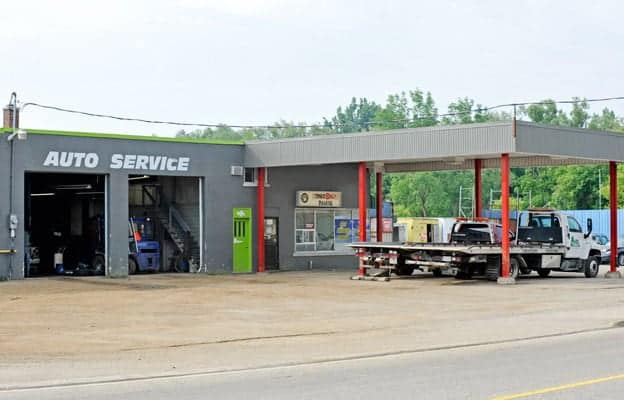After a week in limbo, Michelle Shannon and John Weber may have a solution to the hazardous waste illegally dumped at their farm on Weeby Place just outside of Conestogo
![Safety-Kleen and Waste Management have teamed up to dispose of the two dozen barrels of hazardous waste illegally dumped in the sugar bush at 1189 Weeby Pl. near Conestogo last month. [Scott Barber / The Observer]](https://www.observerxtra.com/content/images/wp-content/uploads/2015/06/post_waste.jpg)
Since the Ministry of the Environment and the Region of Waterloo waste management division refused to clean up the mess, a pair of private companies have stepped in to help.
Safety-Kleen, an environmental services company with operations in Breslau, was on site Wednesday testing the contents of the 24 rusty barrels – mostly unlabeled, with some marked as grease or oily water – found by son John-Wesley on the bumpy farm lane at the edge of the family’s sugar bush a week earlier.
They’ve promised to remove any materials they are certified to handle, free of charge.
That’s a big relief for Weber, who was quoted removal fees of up to $12,000 to get rid of the mess, which was more than double the $5,000 his insurance company offered to cover.
“It’s a relief to know that it’s being taken care of,” Weber said. “We still feel violated, but we are very grateful that (Safety-Kleen and Waste Management) have stepped up.”
Once the barrels are gone, the private garbage removal company Waste Management has offered to haul away the contaminated organic materials – soil, clay and brush – for free.
That will limit Shannon and Weber’s costs to the excavation of the site as well as a number of measures they plan to take to prevent another dumping incident on the property.
“We’re going to change the front here (of the entrance to the sugar bush),” Weber said. “We’re going to trim the trees back so it’s not so hidden. I’m going to cut those trees down in the middle and when we get the guy with the high hoe back here, I’m going to have him flatten and level the area.”
The lane is the only access point for the sugar bush and the sugar shack, so they’re going to need to truck gravel in to fill in whatever is excavated. Afterwards, they’re going to install cameras to make sure if someone attempts to take advantage of their property again, they can be held accountable.
Weber thinks the dumping must have occurred sometime in mid-May, since he had been in the area where the mess was found earlier in the month.
He may have seen the truck, he said, but didn’t think much of it at the time since neighbours, Mennonites, hunters and dirt bikers often use the route, even though it is private property.
And he never expected someone would do something like this. The farm has been in his family for more than 80 years, and the only case of illegal dumping was an old tractor engine found on the dirt road of Weeby Place a number of years back. That wasn’t a big deal though, since scrap metal yards will pay to take an engine off your hands.
Weber is also frustrated with the response he received from the Waterloo Regional Police.
“The (police officer) turned Michelle down the first night,” Weber said, explaining that an officer told her that they didn’t deal with dumping issues on private property. “I would have liked an explanation on that. … That wasn’t even the cop, he just spoke through the receptionist. He didn’t even get on the phone to ask about the nature of it or how much was there, he just said they don’t handle that. I find that hard to believe.”
After the incident was reported in the local media on June 1, Weber says the police did an about-face, turning up to do an investigation that afternoon, more than five days after they were first called.
Still, finding the perpetrator won’t be easy.
“It will be difficult for police to determine who is responsible, since the barrels may have been there for several weeks before being reported,” WRPS spokesman Olaf Heinzel said in an e-mail. “Our main hope is that someone who knows who did it will contact us. … We are working with the Ministry of the Environment and it is our hope they will be able to determine the contents of the barrels. If hazardous materials are found, then there may (be) an offence under environmental legislation. Police don’t normally lay such a charge. If the materials turn out not to be hazardous by definition, then this may be a case of someone dumping garbage. Since private property is involved, there may be a trespassing or mischief offence involved. We won’t know until we find out more about the circumstances under which the barrels got there.”
Regarding Weber’s assertion that police initially “blew them off,” Heinzel said he couldn’t “know the contents of conversations between members of our service and the community,” because they “have nearly a thousand calls for service a day.”
He added, “We can’t rule out that the initial response provided by police was based on the information provided or question asked by the homeowner. If for example, the homeowner asked about how to get these barrels removed, then yes, they would have been told that police don’t provide that service and they would have been referred to another agency.”
For their part, the regional and provincial government bodies tasked with waste management and protecting the environment weren’t offering any solutions, either, Weber said.
The Region of Waterloo says they only deal with residential waste, and they aren’t responsible for remediating any dumping on private property.
And while the Ministry of the Environment sent investigators to monitor the site on Tuesday and Wednesday, they also insisted it isn’t their job to remove the mess.
“Ministry staff (have been) at the site monitoring the cleanup work,” spokeswomen Kate Jordan said. “Preparations are underway for the removal of the barrels and impacted soils are being addressed. We expect this work to take a couple of days to complete. This matter is now under formal ministry investigation to determine if there is sufficient evidence to support charges.”
On site Wednesday morning gathering samples from the barrels, Jeff Hoover of Safety-Kleen said testing would take 24 to 48 hours, after which the company would be back to haul everything away.









